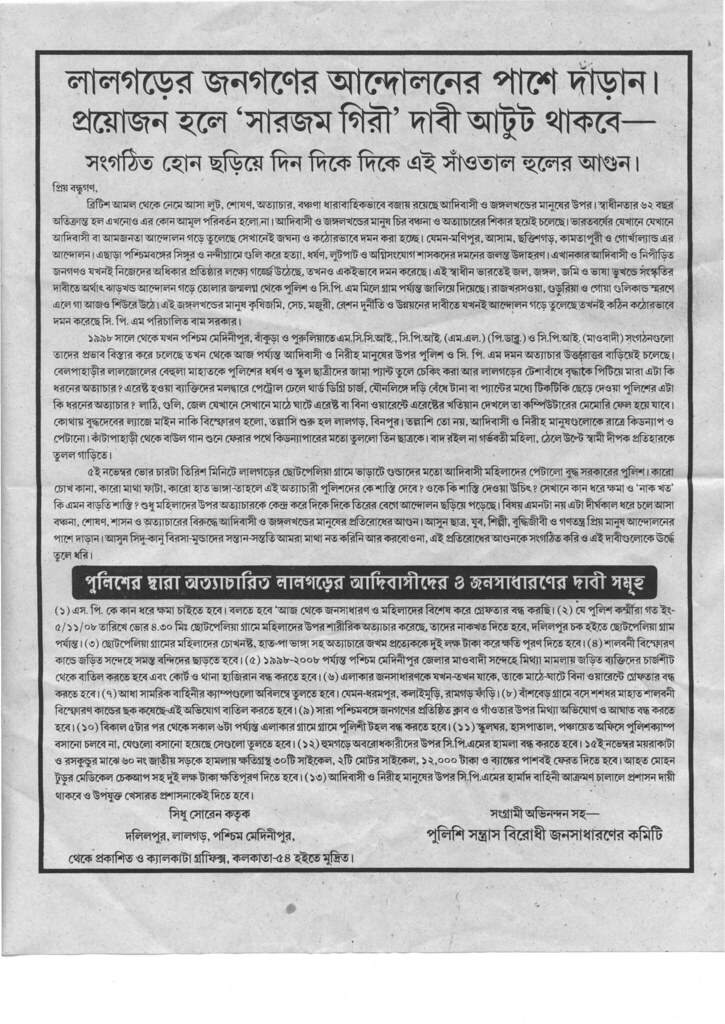December 28, 2008
Partho Sarathi Ray, Sanhati
Sambhu Singh and his brother has now spent three nights in the rubble of their former home, taking turns to sleep on their own broken-down door, with a blanket bought by the money contributed by the people. The South City management put up a notice on the remains of their home, stating “unsafe, entry prohibited”. It is ironic that it is the same South City management who made the place, a home for a family, unsafe in the first place. It is public pressure that has maintained the position of Sambhu Singh in his home till now, but we don’t know how long that will be possible. Legal options are being explored, but nothing much can be done till 2nd January, when the courts are going to reopen after the winter vacation. South City cunningly selected this time to perpetrate this crime.
On 27th December, the CPI(M) controlled Nagarik Samiti, also held a meeting in “support” of Sambhu Singh, and condemned the people who have been with him from the beginning of the struggle as “naxalites”. I guess it isn’t very surprising, but this complicates the situation further. Today, Sunday, 28th December, there is another public protest in front of South City which everyone is invited to attend.
December 29, 2008:
You have no future: CPIM’s Nagarik Committee pressurizes Mr. Singh, intervenes in favour of big capital
Partho Sarathi Ray, Sanhati
There have been ominous developments yesterday, that has again exposed the face of the CPI(M) as the agent of big capital.
In my last update I had mentioned that the CPI(M) controlled Nagarik Committee had organized a meeting on 27th December, ostensibly to support Sambhu Singh. On 28th December, leaders of the Nagark Samiti that included CPI(M) local committee members, compelled Sambhu Singh to go into a negotiation with South City management. Even though Sambhu Singh had been advised by us to only go if accompanied by his lawyer, he was not allowed to call his lawyer. In the negotiations, in presence 93 Ward Nagarik Committee members Amber Roy Choudhary, Pelab Mukherjee, Parimal Bhattacharya, Jayanta Poddar, Arun Agarwal and Tarun Mistry, Sambhu was threatened by Sushil Mohta and Man Mohan Bagree of South City that he had nothing in favour of him and he had no way to survive if he tried to stay back in his house.
The Nagarik Committee members supported this and persuaded him to arrive at a settlement with South City. Finally overwhelmed by these threats, Sambhu caved in, and signed on a non-legal agreement with South City, where he has agreed to give up possession all claims to his house, withdraw civil and criminal cases against South City, and accept that he has himself removed all his belongings (all of which was looted by South City’s hired security) from his premises.
All this in return of a paltry Rs 4 lakhs (4,00,000), when the actual vaulation of the space occupied by Sambhu Singh’s house is around ten times more!
There is no compensation, not even an acknowledgement, of the illegal assault on his family and their eviction.
This is a repetition of what is a common procedure in Bengal. South City realized that it was in a very bad sitaution after committing this illegal act and from the resultant public backlash, which they hadn’t expected would be there. In order to save them from this situation, appeared the CPI(M). Repeating what it had done when the workers of the Usha factory were originally thrown out of their jobs, it acted as agent and broker, allowing the corporation to get away with paying a pittance as compensation, victimising the poor worker.
Irrespective of the outcome regarding Sambhu Singh, it has been decided that the protests against South City would be intensified. Armed with this direct evidence of the Nagarik Committee’s heinous intervention in the matter, the struggle would be directed against the corporations and their agent and broker, the CPI(M)
December 30, 2008:
Sambhu Singh fights back yet again
Sambhu Singh decided yesterday that he would fight back against South City and CPI(M) by lodging a complaint that he was made to sign on the plain paper agreement against his will and under compulsion.
Source: http://sanhati.com/excerpted/1183/#7
